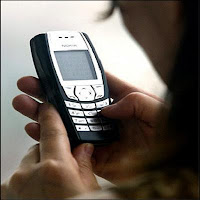 T-Moble, ATT and Verizon have increased the cost for texting to twenty-cents a message. Not too long ago text messages were free. Prices have doubled in two years (100% increase). Free Press reports that
T-Moble, ATT and Verizon have increased the cost for texting to twenty-cents a message. Not too long ago text messages were free. Prices have doubled in two years (100% increase). Free Press reports thatThere have been no additional costs [to the phone corporations] that would necessitate a price hike.At the new price, texting is at least four times more expensive for the customer than the cost to transmit data from the Hubble telescope.
We're facing a 7,314% mark-up; serious price gouging. The actual cost to the cell phone corporations is 0.015 cents per kilobyte compared to 109.71 cents per kilobyte charged to customers (or about a dollar and ten cents $1.10. A 7,314% differential).
If the same price mark-up used for texting was used for downloading a 4 Meg song, it would cost the user almost $6,000.
Feeling a little pissed off at the cell phone corporations? You'll be even more pissed when you learn that the phone corporations are charging for otherwise unused transmission capacity. Free Press explains it this way:
[T]he cost to carriers to transmit text messages is next to nothing [about two one-hundredths of a penny per kilobyte noted above, 0.015 cents]. Here's why. When a cell phone is on, it is constantly connected to a cell phone tower as it waits for a call or data. The cell phone and tower send little data packets to one another to keep in touch. These packets hold 160 characters. That's why a text message can carry only 160 characters of text, because they hitch a ride on these data packets. So, compared to the cost of transmitting e-mail or downloading data that need their own bandwidth, the cost of text messaging is exorbitant.
"Exorbitant" is a nice way of saying "price gouging."
So what can be done about it? In case you haven't noticed, a small number of huge corporations dominate the telecom industry. This near-monopoly situation is known as an oligopoly, and price-setting by oligopolies can be illegal.
For example, in the 1950s American tire companies took turns each year being the first to release their price list. The others would follow by releasing their lists with prices that were... Ta Dah! the SAME! They got busted.
More recently, Oligopoly Watch reported:
Five major chemical companies were caught colluding on prices once again. A cartel made up of American-based firms Dow and DuPont, Germany's Bayer, Italy's Eni, and Japan's Tosoh was convicted of fixing prices for chloroprene. Chloroprene is a kind of synthetic latex rubber is used in such products as hoses, transmission belts, condoms and shoes.
The European commission fined the companies over $300 million for the cartel, which reportedly operated from 1992 to 2003. The participants allegedly met together to discuss prices on a regular basis.
But, as noted above, they don't even have to meet together to violate prohibitions on price-fixing.
You and your friends can make a difference. Contact the Federal Communications Commission (FCC) and ask them to "investigate price-fixing on text messages among cell phone companies."
CONTACT the FCC Do it today. You'll feel better and together we might get text message prices down to less than a penny a message.
Sources:
Free Press, Media Minutes for July 18, 2008 (Audio and links to all sources), e.g., Spoiled Techie




No comments:
Post a Comment